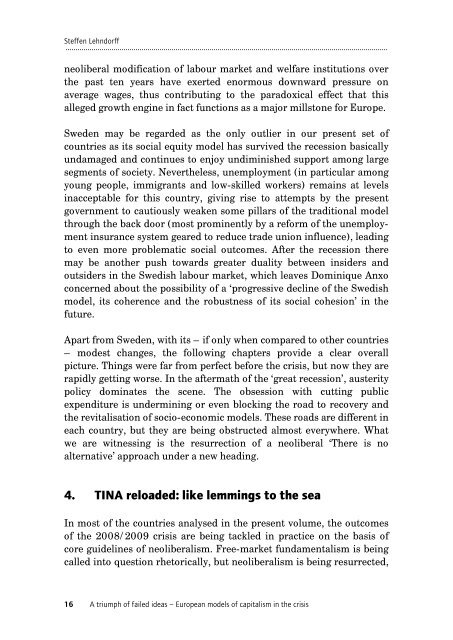A triumph of failed ideas European models of capitalism in ... - Journal
A triumph of failed ideas European models of capitalism in ... - Journal
A triumph of failed ideas European models of capitalism in ... - Journal
You also want an ePaper? Increase the reach of your titles
YUMPU automatically turns print PDFs into web optimized ePapers that Google loves.
Steffen Lehndorff.................................................................................................................................................................neoliberal modification <strong>of</strong> labour market and welfare <strong>in</strong>stitutions overthe past ten years have exerted enormous downward pressure onaverage wages, thus contribut<strong>in</strong>g to the paradoxical effect that thisalleged growth eng<strong>in</strong>e <strong>in</strong> fact functions as a major millstone for Europe.Sweden may be regarded as the only outlier <strong>in</strong> our present set <strong>of</strong>countries as its social equity model has survived the recession basicallyundamaged and cont<strong>in</strong>ues to enjoy undim<strong>in</strong>ished support among largesegments <strong>of</strong> society. Nevertheless, unemployment (<strong>in</strong> particular amongyoung people, immigrants and low-skilled workers) rema<strong>in</strong>s at levels<strong>in</strong>acceptable for this country, giv<strong>in</strong>g rise to attempts by the presentgovernment to cautiously weaken some pillars <strong>of</strong> the traditional modelthrough the back door (most prom<strong>in</strong>ently by a reform <strong>of</strong> the unemployment<strong>in</strong>surance system geared to reduce trade union <strong>in</strong>fluence), lead<strong>in</strong>gto even more problematic social outcomes. After the recession theremay be another push towards greater duality between <strong>in</strong>siders andoutsiders <strong>in</strong> the Swedish labour market, which leaves Dom<strong>in</strong>ique Anxoconcerned about the possibility <strong>of</strong> a ‘progressive decl<strong>in</strong>e <strong>of</strong> the Swedishmodel, its coherence and the robustness <strong>of</strong> its social cohesion’ <strong>in</strong> thefuture.Apart from Sweden, with its – if only when compared to other countries– modest changes, the follow<strong>in</strong>g chapters provide a clear overallpicture. Th<strong>in</strong>gs were far from perfect before the crisis, but now they arerapidly gett<strong>in</strong>g worse. In the aftermath <strong>of</strong> the ‘great recession’, austeritypolicy dom<strong>in</strong>ates the scene. The obsession with cutt<strong>in</strong>g publicexpenditure is underm<strong>in</strong><strong>in</strong>g or even block<strong>in</strong>g the road to recovery andthe revitalisation <strong>of</strong> socio-economic <strong>models</strong>. These roads are different <strong>in</strong>each country, but they are be<strong>in</strong>g obstructed almost everywhere. Whatwe are witness<strong>in</strong>g is the resurrection <strong>of</strong> a neoliberal ‘There is noalternative’ approach under a new head<strong>in</strong>g.4. TINA reloaded: like lemm<strong>in</strong>gs to the seaIn most <strong>of</strong> the countries analysed <strong>in</strong> the present volume, the outcomes<strong>of</strong> the 2008/2009 crisis are be<strong>in</strong>g tackled <strong>in</strong> practice on the basis <strong>of</strong>core guidel<strong>in</strong>es <strong>of</strong> neoliberalism. Free-market fundamentalism is be<strong>in</strong>gcalled <strong>in</strong>to question rhetorically, but neoliberalism is be<strong>in</strong>g resurrected,16 A <strong>triumph</strong> <strong>of</strong> <strong>failed</strong> <strong>ideas</strong> – <strong>European</strong> <strong>models</strong> <strong>of</strong> <strong>capitalism</strong> <strong>in</strong> the crisis








